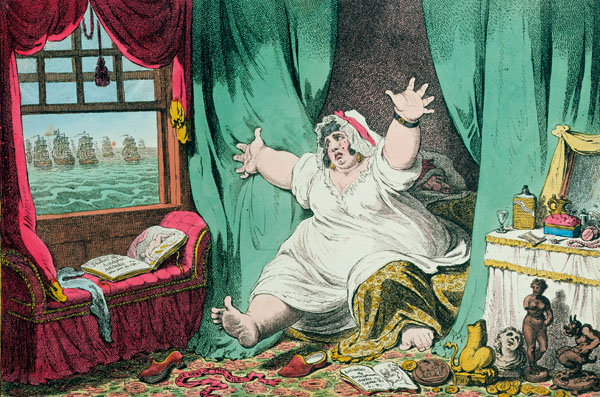Horatio Nelson is England’s most loved military hero. Marlborough is remote from our view, and the aristocratic Wellington was perhaps too stiff and unbending a Tory for popular taste. Nelson, by contrast, had an engaging personality and a colourful private life. The disabling wounds that he suffered and the affecting circumstances of his death in the midst of the country’s greatest naval victory have secured him in the national memory. The navy, at any rate, has deeper roots in national sentiment than the army; it was seapower, after all, that carried Great Britain and its empire to pre-eminence in the world.
The second volume of John Sugden’s biography, covering the last eight years of Nelson’s life, might have been shorter. The piling on of unimportant details is at times wearying. Do we need to know that Nelson stopped for an uneventful lunch at an inn and that the inn had five floors with a store at ground level? Or that at a service of worship Emma Hamilton wore a white blouse? Some fruits of research are best left unharvested. Even Nelson’s most fervent admirers may find their stamina tested.
They will, however, be rewarded with an authoritative account of Nelson’s dramatic naval and personal life. In prose of admirable clarity Sugden binds together the strategy, tactics and course of battles, with powerful evocations of their tumult and horror, into lively narrative. It is an achievement of high literary skill. He demonstrates that what marked Nelson out was the self-confidence to take risks and to engage the enemy at the heart of its strength, even when, as at Trafalgar, heavily outnumbered. He was always eager for the fight, enterprising, spirited and impatient of inaction or delay. Copenhagen, as he said, was ‘warm work’; but he immediately added ‘mark you, I would not be elsewhere for thousands’.
The story begins in September 1797, with Nelson, lionised as never before after the battle of St Vincent, enduring a painful recuperation at Bath from the loss of his right arm and fretting that his career might be cut short. That was fanciful. As Lord Addington said, when it came to a fight, Nelson was the man ‘to strike a great blow’. But however fanciful, it was not play-acting. Throughout his last eight years, Nelson was racked by pain and illness, a gaunt figure given to brooding on the imminence of death.
He emerges from Sugden’s book as a man of neurotic disposition, nursing resentments at slights, real and imagined, not doubting his own abilities, but anxious lest others should doubt them. He constantly sought praise and reassurance (how delightful that Sugden should write ‘for reasons that no one can now safely diagnose!) and, being needy himself, recognised the needs of others. Perhaps his finest quality was the generosity he showed in praising and loving and helping others, especially the men under his command. He called them his ‘band of brothers’, and they repaid him with their own fighting spirit and a deep affection.
At the lowest ebb of his career, after mixed success in the Two Sicilies and Malta, in regard to the defence of which his treatment of Lord Keith, the Mediterranean commander-in-chief, came close to insubordination, his critics began to look upon him as ‘weak and unsafe’. For the first time in his life, Sugden writes, Nelson had become ‘an impediment rather than an asset of the service he had loved.’ St Vincent described him at this time as ‘devoured with vanity, weakness and folly’, in other words with Emma, Lady Hamilton, the object of establishment distaste and of Nelson’s unquenchable infatuation. She drew him from business, clouded his judgment and sullied his reputation. Low-born and suspected of having a courtesan past, Emma no doubt had what Lord Minto called ‘barmaid manners’. But she was also, Sugden writes, ‘herself one of the essential sights of Naples’, a woman of infinite zest, and she and her husband, William, took Nelson to their bosoms with unalloyed love and unqualified admiration. They answered perfectly to his neediness.
Sugden’s telling of the tempestuous affair is without blemish, and he records the desolation of Fanny, Nelson’s abandoned wife who had patiently kept the home fires burning and devotedly cared for his aging father, with simplicity and unsentimental compassion. When Nelson returned to England from the Two Sicilies in late 1800, she accompanied him at celebratory public functions where Emma also attended him and pointedly received his attentions. The ordeal of that ‘cocktail of public adulation and private anguish’ was scarcely endurable.
Yet Fanny’s love for her husband never altered. Recalled to the Baltic early in 1801, Nelson left her without a goodbye, merely a note to say that he had arrived safely at Southampton. They never met again. His last, complaining letter to her, from Torbay, was brutal. As he lay dying, with calm resignation, she was absent from his mind. His care was provision for Emma and his daughter by her, Horatia. Sugden does not sit in judgment. He simply tells the story.






Comments